小说阅读与欣赏
高中生经典英文小说阅读与欣赏系列TheLastLesson

⾼中⽣经典英⽂⼩说阅读与欣赏系列TheLastLessonThe Last Lessonby Alphonse DaudetI started for school very late that morning and was in great dread of a scolding, especially because M. Hamel had said that he would question us on participles, and I did not know the first word about them. For a moment I thought of running away and spending the day out of doors. It was so warm, so bright! The birds were chirping at the edge of the woods; and in the open field back of the sawmill the Prussian soldiers were drilling. It was all much more tempting than the rule for participles, but I had the strength to resist, and hurried off to school.When I passed the town hall there was a crowd in front of the bulletin-board. For the last two years all our bad news had come from there—the lost battles, the draft, the orders of the commanding officer—and I thought to myself, without stopping:“What can be the matter now?”Then, as I hurried by as fast as I could go, the blacksmith, Wachter, who was there, with his apprentice, reading the bulletin, called after me:“Don’t go so fast, bub; you’ll get to your school in plenty of time!”I thought he was making fun of me, and reached M. Hamel’s little garden all out of breath.Usually, when school began, there was a great bustle, which could be heard out in the street, the opening and closing of desks, lessons repeated in unison, very loud, with our hands over our ears to understand better, and the teacher’s great ruler rapping on the table. But now it was all so still! I had counted on the commotion to get to my desk without being seen; but, of course, that day everything had to be as quiet as Sunday morning. Through the window I saw my classmates, already in their places, and M. Hamel walking up and down with his terrible iron ruler under his arm. I had to open the door and go in before everybody. You can imagine how I blushed and how frightened I was.But nothing happened. M. Hamel saw me and said very kindly:“Go to your place quickly, little Franz. We were beginning without you.”I jumped over the bench and sat down at my desk. Not till then, when I had gota little over my fright, did I see that our teacher had on his beautiful green coat, his frilled shirt, and the little black silk cap, all embroidered, that he never wore except on inspection and prize days. Besides, the whole school seemed so strange and solemn. But the thing that surprised me most was to see, on the back benches that were always empty, the village people sitting quietly like ourselves; old Hauser, with his three-cornered hat, the former mayor, the former postmaster, and several others besides. Everybody looked sad; and Hauser had brought an old primer, thumbed at the edges, and he held it open on his knees with his great spectacles lying across the pages.While I was wondering about it all, M. Hamel mounted his chair, and, in the same grave and gentle tone which he had used to me, said:“My children, this is the last lesson I shall give you. The order has come from Berlin to teach only German in the schools of Alsace and Lorraine. The new master comes to-mor row. This is your last French lesson. I want you to be very attentive.”What a thunderclap these words were to me!Oh, the wretches; that was what they had put up at the town-hall!My last French lesson! Why, I hardly knew how to write! I should never learn any more! I must stop there, then! Oh, how sorry I was for not learning my lessons, for seeking birds’ eggs, or going sliding on the Saar! My books, that had seemed such a nuisance a while ago, so heavy to carry, my grammar, and my history of the saints, were old friends now that I couldn’t give up. And M. Hamel, too; the idea that he was going away, that I should never see him again, made me forget all about his ruler and how cranky he was.Poor man! It was in honor of this last lesson that he had put on his fine Sunday clothes, and now I understood why the old men of the village were sitting there in the back of the room. It was because they were sorry, too, that they had not gone to school more. It was their way of thanking our master for his forty years of faithful service and of showing their respect for the country that was theirs no more.While I was thinking of all this, I heard my name called. It was my turn to recite. What would I not have given to be able to say that dreadful rule for the participle all through, very loud and clear, and without one mistake? But I got mixed up on the first words and stood there, holding on to my desk, my heart beating, and not daring to look up. I heard M. Hamel say to me:“I won’t scold you, little Franz; you must feel bad enough. See how it is! Every day we have said to ourselves: ‘Bah! I’ve plenty of time. I’ll learn it to-morrow.’ And now you see where we’ve come out. Ah, that’s the great trouble with Alsace; she puts off learning till to-morrow. Now those fellows out there will have the right to say to you: ‘How is it; you pretend to be Frenchmen, and yet you can neither speak nor write your own language?’ But you are not the worst, poor little Franz. We’ve all a great deal to reproach ourselves with.“Your pare nts were not anxious enough to have you learn. They preferred to put you to work on a farm or at the mills, so as to have a little more money. And I? I’ve been to blame also. Have I not often sent you to water my flowers instead of learning your lessons? And when I wanted to go fishing, did I not just give you a holiday?”Then, from one thing to another, M. Hamel went on to talk of the French language, saying that it was the most beautiful language in the world—the clearest, the most logical; that we must guard it among us and never forget it, because when a people are enslaved, as long as they hold fast to their language it is as if they had the key to their prison. Then he opened a grammar and read us our lesson. I was amazed to see how well I understood it. All he said seemed so easy, so easy! I think, too, that I had never listened so carefully, and that he had never explained everything with so much patience. It seemed almost as if the poor man wanted to give us all he knew before going away, and to put it all into our heads at one stroke. After the grammar, we had a lesson in writing. That day M. Hamel had new copies for us, written in a beautiful round hand: France, Alsace, France, Alsace. They looked like little flags floating everywhere in the school-room, hung from the rod at the top of our desks. You ought to have seen how every one set to work, and how quiet it was! The only sound was the scratching of the pens over the paper. Once some beetles flew in; but nobody paid any attention to them, not even the littlest ones, who worked right on tracing their fish-hooks, as if that was French, too. On the roof the pigeons cooed very low, and I thought to myself: “Will they make them sing in German, even the pigeons?”Whenever I looked up from my writing I saw M. Hamel sitting motionless in his chair and gazing first at one thing, then at another, as if he wanted to fix in his mind just how everything looked in that little school-room. Fancy! For forty years he had been there in the same place, with his garden outside the window and his class in front of him, just like that. Only the desks and benches had been worn smooth; the walnut-trees in the garden were taller, and the hopvine that he had planted himself twined about the windows to the roof. How it must have broken his heart to leave it all, poor man; to hear his sister moving about in the room above, packing their trunks! For they must leave the country next day.But he had the courage to hear every lesson to the very last. After the writing, we had a lesson in history, and then the babies chanted their ba, be bi, bo, bu. Down there at the back of the room old Hauser had put on his spectacles and, holding his primer in both hands, spelled the letters with them. You could see that he, too, was crying; his voice trembled with emotion, and it was so funny to hear him that we all wanted to laugh and cry. Ah, how well I remember it, that last lesson!All at once the church-clock struck twelve. Then the Angelus. At the same moment the trumpets of the Prussians, returning from drill, sounded under our windows. M. Hamel stood up, very pale, in his chair. I never saw him look so tall.“My friends,” said he, “I—I—” But something choked him. He could not go on.Then he turned to the blackboard, took a piece of chalk, and, bearing on withall his might, he wrote as large as he could:“Vive La France!”Then he stopped and leaned his head against the wall, and, without a word, he made a gesture to us with his hand:“School is dismissed—you may go.”。
小小说名作、佳作阅读和欣赏(4)
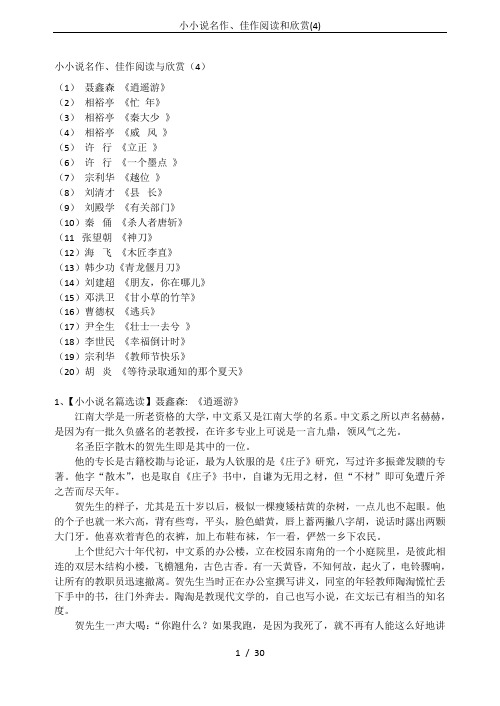
小小说名作、佳作阅读与欣赏(4)(1)聂鑫森《逍遥游》(2)相裕亭《忙年》(3)相裕亭《秦大少》(4)相裕亭《威风》(5)许行《立正》(6)许行《一个墨点》(7)宗利华《越位》(8)刘清才《县长》(9)刘殿学《有关部门》(10)秦俑《杀人者唐斩》(11 张望朝《神刀》(12)海飞《木匠李直》(13)韩少功《青龙偃月刀》(14)刘建超《朋友,你在哪儿》(15)邓洪卫《甘小草的竹竿》(16)曹德权《逃兵》(17)尹全生《壮士一去兮》(18)李世民《幸福倒计时》(19)宗利华《教师节快乐》(20)胡炎《等待录取通知的那个夏天》1、【小小说名篇选读】聂鑫森: 《逍遥游》江南大学是一所老资格的大学,中文系又是江南大学的名系。
中文系之所以声名赫赫,是因为有一批久负盛名的老教授,在许多专业上可说是一言九鼎,领风气之先。
名圣臣字散木的贺先生即是其中的一位。
他的专长是古籍校勘与论证,最为人钦服的是《庄子》研究,写过许多振聋发聩的专著。
他字“散木”,也是取自《庄子》书中,自谦为无用之材,但“不材”即可免遭斤斧之苦而尽天年。
贺先生的样子,尤其是五十岁以后,极似一棵瘦矮枯黄的杂树,一点儿也不起眼。
他的个子也就一米六高,背有些弯,平头,脸色蜡黄,唇上蓄两撇八字胡,说话时露出两颗大门牙。
他喜欢着青色的衣裤,加上布鞋布袜,乍一看,俨然一乡下农民。
上个世纪六十年代初,中文系的办公楼,立在校园东南角的一个小庭院里,是彼此相连的双层木结构小楼,飞檐翘角,古色古香。
有一天黄昏,不知何故,起火了,电铃骤响,让所有的教职员迅速撤离。
贺先生当时正在办公室撰写讲义,同室的年轻教师陶淘慌忙丢下手中的书,往门外奔去。
陶淘是教现代文学的,自己也写小说,在文坛已有相当的知名度。
贺先生一声大喝:“你跑什么?如果我跑,是因为我死了,就不再有人能这么好地讲《庄子》了。
”陶淘连忙恭敬地侧立门边,说:“贺先生,您请!”事后,贺先生对陶淘说:“我让你等一下,是想提醒你,什么事都不必慌乱,泰山崩于前而色不变。
高三语文高考复习教案:文学类文本阅读之小说阅读与欣赏

小说主要考查学生的形象思维能力,重在考查学生对小说的分析综合和鉴赏评价能力。具体有以下三点:
①从小说的整体构思、贯穿线索、社会环境等角度概括小说的主题并对作品表现出来的价值判断和审美取向作出评价。
②突出小说中人物、情节、环境构成的形象世界,鼓励考生从不同角度和层面发掘作品的丰富意蕴。
⑵情节安排基本技巧
①顺叙:按时间(空间)顺序来写,情节发展脉络分明,层次清晰。
②倒叙:不按时间先后顺序,而是把某些发生在后的情节或结局先行提出,然后再按顺序叙述下去的一种方法。造成悬念,引人入胜。
③插叙:在叙述主要事件的过程中,插入另一与之有关的事件,然后再接上原来的事件写。对主要情节或中心事件做必要补充说明,使情节更加完整,结构更加严密,内容更加充实丰满。
⑵答题示例
例1:07清远一模《午后的故事》:小说题目是“午后的故事”,文中多次写到午后明亮的阳光,作用是什么?(4分)
①交代故事发生的时间。(指向环境)
②暗示有人竟在光天化日之下行凶。(指向情节)
③映衬老人见义勇为的高大形象。(指向人物)
④暗示竟无人制止在阳光下的罪恶。(指向主题)
例2(08浙江卷)《乌米》19题:指出第5自然段中景物描写所采用的手法,并简析该段景物描写的作用。(5分)
⒋答题指要
⑴解题思路:
明确环境描写必须为主题服务的宗旨,结合环境描写的作用:
①交代故事发生的时间地点;
②暗示社会环境(背景、习俗、思想观念以及人与人之间的关系等);
③揭示人物心境,表现人物身份、地位、性格;
④渲染气氛、奠定基调;
⑤推动情节的发展或作为情节线索;
⑥揭示或深化主旨。
然后根据题目要求,结合文章作答。
小小说名作、佳作阅读和欣赏(10)
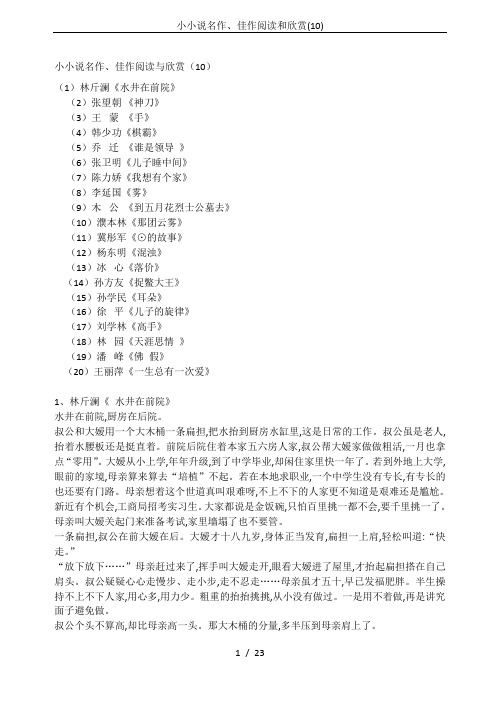
小小说名作、佳作阅读与欣赏(10)(1)林斤澜《水井在前院》(2)张望朝《神刀》(3)王蒙《手》(4)韩少功《棋霸》(5)乔迁《谁是领导》(6)张卫明《儿子睡中间》(7)陈力娇《我想有个家》(8)李延国《雾》(9)木公《到五月花烈士公墓去》(10)濮本林《那团云雾》(11)冀彤军《⊙的故事》(12)杨东明《混浊》(13)冰心《落价》(14)孙方友《捉鳖大王》(15)孙学民《耳朵》(16)徐平《儿子的旋律》(17)刘学林《高手》(18)林园《天涯思情》(19)潘峰《佛假》(20)王丽萍《一生总有一次爱》1、林斤澜《水井在前院》水井在前院,厨房在后院。
叔公和大嫒用一个大木桶一条扁担,把水抬到厨房水缸里,这是日常的工作。
叔公虽是老人,抬着水腰板还是挺直着。
前院后院住着本家五六房人家,叔公帮大嫒家做做粗活,一月也拿点“零用”。
大嫒从小上学,年年升级,到了中学毕业,却闲住家里快一年了。
若到外地上大学,眼前的家境,母亲算来算去“培植”不起。
若在本地求职业,一个中学生没有专长,有专长的也还要有门路。
母亲想着这个世道真叫艰难呀,不上不下的人家更不知道是艰难还是尴尬。
新近有个机会,工商局招考实习生。
大家都说是金饭碗,只怕百里挑一都不会,要千里挑一了。
母亲叫大嫒关起门来准备考试,家里墙塌了也不要管。
一条扁担,叔公在前大嫒在后。
大嫒才十八九岁,身体正当发育,扁担一上肩,轻松叫道:“快走。
”“放下放下……”母亲赶过来了,挥手叫大嫒走开,眼看大嫒进了屋里,才抬起扁担搭在自己肩头。
叔公疑疑心心走慢步、走小步,走不忍走……母亲虽才五十,早已发福肥胖。
半生操持不上不下人家,用心多,用力少。
粗重的抬抬挑挑,从小没有做过。
一是用不着做,再是讲究面子避免做。
叔公个头不算高,却比母亲高一头。
那大木桶的分量,多半压到母亲肩上了。
才几步,叔公叫放下,看看母亲脸色,只要母亲在前他随后,好把木桶上的绳子撸到自己胸前,伸手抓住绳子不叫滑回去。
母亲稍微轻松一点了,她早准备好一个笑容挂到脸上,一路遇见本家三姑六婆四姨七嫂,才听见一声啊呀哟的,不管人家说什么,就自笑自话:“好走好走……”“不重不重……”“一回生两回熟……”前院和后院中间,有一道一尺高的门槛,平时母亲走到这里,总要斜过身体,让旗袍开衩口朝前,正好把“放大”脚横着过去。
【课件精创】高考专题复习:小说阅读之赏析语言 课件26张

• (二)赏析小说语言类试题,多数表述为“赏析某句话的妙处(含意、意 蕴)”。解题时,尤其要注意以下几个方面:
• ①看这句话所在的语境,包括上下文、描述(说话、评论)的对象、小说的 主旨等;
• ②分解要赏析的语句,看看能分解成几部分,抓住这句话中的关键词语, 分析这句话有没有蕴含什么深刻含意(字面意义、语境含义、比喻义、象征义、 指代义、双关义等),对于环境描写、人物形象刻画、主旨表达、情节发展等 的作用;
• (4)在引用原文内容之后,分析具体手法及幽默效果,组织答案。
• 【参考答案】
• ①如“知之为知之,不知为知之”,或“一部伦理从何处说起”,借用并 改换了经典语句,以造成幽默效果;
• ②如出门时二姥姥找眼镜,三舅妈找钮子,四狗子洗脸,同一行为模式重 复多次,产生喜剧效果;
• ③如“既来之则安之,打了票”,或“忽前忽后,忽左忽右,离而复散, 分而复合,主张不一,而又愿坐在一块儿”,将书面语与口语混搭,庄谐并 出;
• 糖买过了,二姥姥想起一桩大事——还没咳嗽呢。二姥姥一阵咳嗽,惹起 二姐的孝心,与四姨三舅妈说起二姥姥的后事来。老人家像二姥姥这样的, 是不怕儿女当面讲论自己的后事,而且乐意参加些意见,如“别的都是小事, 我就是要个金九连环。也别忘了糊一对童儿!”这一说起来,还有完吗?说 也奇怪,越是在戏馆电影场里,家事越显着复杂。大家刚说到热闹的地方, 忽,电灯亮了,人们全往外走。二姐喊卖瓜子的;说起家务要不吃瓜子便不 够派儿。看座的过来了,“这场完了,晚场八点才开呢。”
• 角度四:从语言风格的角度品味。答题要点:幽默风趣、典雅庄重、含蓄 蕴藉、清新明快、自然质朴、绚丽华美等。
三、巩固训练
• (2020·全国3卷·高考真题)阅读下面的文字,完成下面小题。 • 记忆里的光 蒋子龙 • 我八岁才第一次见到火车。1949年初冬,我正式走进学校,在班上算年龄小的。一位见多识 广的大同学,炫耀他见过火车的经历,说火车是世界上最神奇、最巨大的怪物,特别是在夜晚, 头顶放射着万丈光芒,喘气像打雷,如天神下界,轰轰隆隆,地动山摇,令人胆战心惊。许多同 学都萌生了夜晚去看火车的念头。 • 一天晚上,真要付诸行动了,却只集合起我和三个大一点的同学。离我们村最近的火车站叫 姚官屯,十来里地,当时对我来说,就像天边儿一样远。最恐怖的是要穿过村西一大片浓密的森 林,里面长满奇形怪状的参天大树。森林中间还有一片凶恶的坟场,曾经听的所有鬼故事,几乎 都发生在那里面,即便大白天我一个人也不敢从里面穿过。进了林子以后我们都不敢出声了,我 怕被落下,不得不一路小跑,我跑他们也跑,越跑就越瘆得慌,只觉得每根头发梢都竖了起来。 当时天气已经很凉,跑出林子后却浑身都湿透了。
高中生经典英文小说阅读与欣赏系列 The Looking Glass
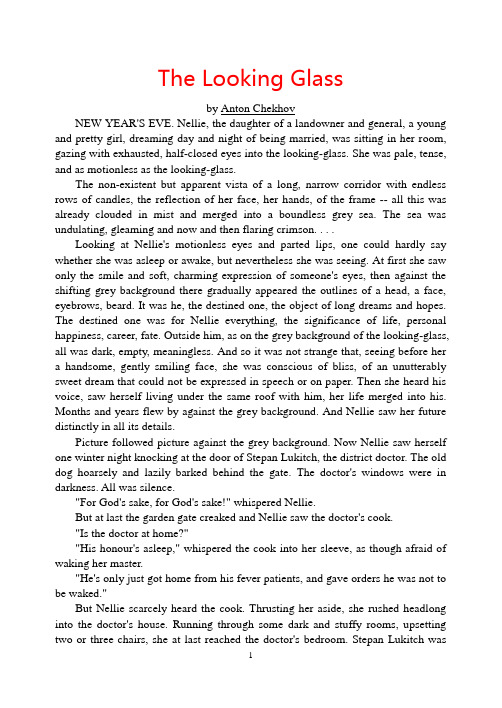
The Looking Glassby Anton ChekhovNEW YEAR'S EVE. Nellie, the daughter of a landowner and general, a young and pretty girl, dreaming day and night of being married, was sitting in her room, gazing with exhausted, half-closed eyes into the looking-glass. She was pale, tense, and as motionless as the looking-glass.The non-existent but apparent vista of a long, narrow corridor with endless rows of candles, the reflection of her face, her hands, of the frame -- all this was already clouded in mist and merged into a boundless grey sea. The sea was undulating, gleaming and now and then flaring crimson. . . .Looking at Nellie's motionless eyes and parted lips, one could hardly say whether she was asleep or awake, but nevertheless she was seeing. At first she saw only the smile and soft, charming expression of someone's eyes, then against the shifting grey background there gradually appeared the outlines of a head, a face, eyebrows, beard. It was he, the destined one, the object of long dreams and hopes. The destined one was for Nellie everything, the significance of life, personal happiness, career, fate. Outside him, as on the grey background of the looking-glass, all was dark, empty, meaningless. And so it was not strange that, seeing before her a handsome, gently smiling face, she was conscious of bliss, of an unutterably sweet dream that could not be expressed in speech or on paper. Then she heard his voice, saw herself living under the same roof with him, her life merged into his. Months and years flew by against the grey background. And Nellie saw her future distinctly in all its details.Picture followed picture against the grey background. Now Nellie saw herself one winter night knocking at the door of Stepan Lukitch, the district doctor. The old dog hoarsely and lazily barked behind the gate. The doctor's windows were in darkness. All was silence."For God's sake, for God's sake!" whispered Nellie.But at last the garden gate creaked and Nellie saw the doctor's cook."Is the doctor at home?""His honour's asleep," whispered the cook into her sleeve, as though afraid of waking her master."He's only just got home from his fever patients, and gave orders he was not to be waked."But Nellie scarcely heard the cook. Thrusting her aside, she rushed headlong into the doctor's house. Running through some dark and stuffy rooms, upsetting two or three chairs, she at last reached the doctor's bedroom. Stepan Lukitch waslying on his bed, dressed, but without his coat, and with pouting lips was breathing into his open hand. A little night-light glimmered faintly beside him. Without uttering a word Nellie sat down and began to cry. She wept bitterly, shaking all over."My husband is ill!" she sobbed out. Stepan Lukitch was silent. He slowly sat up, propped his head on his hand, and looked at his visitor with fixed, sleepy eyes. "My husband is ill!" Nellie continued, restraining her sobs. "For mercy's sake come quickly. Make haste. . . . Make haste!""Eh?" growled the doctor, blowing into his hand."Come! Come this very minute! Or . . . it's terrible to think! For mercy's sake!"And pale, exhausted Nellie, gasping and swallowing her tears, began describing to the doctor her husband's illness, her unutterable terror. Her sufferings would have touched the heart of a stone, but the doctor looked at her, blew into his open hand, and -- not a movement."I'll come to-morrow!" he muttered."That's impossible!" cried Nellie. "I know my husband has typhus! At once . . . this very minute you are needed!""I . . . er . . . have only just come in," muttered the doctor. "For the last three days I've been away, seeing typhus patients, and I'm exhausted and ill myself. . . . I simply can't! Absolutely! I've caught it myself! There!"And the doctor thrust before her eyes a clinical thermometer."My temperature is nearly forty. . . . I absolutely can't. I can scarcely sit up. Excuse me. I'll lie down. . . ."The doctor lay down."But I implore you, doctor," Nellie moaned in despair. "I beseech you! Help me, for mercy's sake! Make a great effort and come! I will repay you, doctor!""Oh, dear! . . . Why, I have told you already. Ah!"Nellie leapt up and walked nervously up and down the bedroom. She longed to explain to the doctor, to bring him to reason. . . . She thought if only he knew how dear her husband was to her and how unhappy she was, he would forget his exhaustion and his illness. But how could she be eloquent enough?"Go to the Zemstvo doctor," she heard Stepan Lukitch's voice."That's impossible! He lives more than twenty miles from here, and time is precious. And the horses can't stand it. It is thirty miles from us to you, and as much from here to the Zemstvo doctor. No, it's impossible! Come along, Stepan Lukitch. I ask of you an heroic deed. Come, perform that heroic deed! Have pity on us!""It's beyond everything. . . . I'm in a fever. . . my head's in a whirl . . . and she won't understand! Leave me alone!""But you are in duty bound to come! You cannot refuse to come! It's egoism! A man is bound to sacrifice his life for his neighbour, and you. . . you refuse to come!I will summon you before the Court."Nellie felt that she was uttering a false and undeserved insult, but for her husband's sake she was capable of forgetting logic, tact, sympathy for others. . . . In reply to her threats, the doctor greedily gulped a glass of cold water. Nellie fell to entreating and imploring like the very lowest beggar. . . . At last the doctor gave way. He slowly got up, puffing and panting, looking for his coat."Here it is!" cried Nellie, helping him. "Let me put it on to you. Come along! I will repay you. . . . All my life I shall be grateful to you. . . ."But what agony! After putting on his coat the doctor lay down again. Nellie got him up and dragged him to the hall. Then there was an agonizing to-do over his goloshes, his overcoat. . . . His cap was lost. . . . But at last Nellie was in the carriage with the doctor. Now they had only to drive thirty miles and her husband would have a doctor's help. The earth was wrapped in darkness. One could not see one's hand before one's face. . . . A cold winter wind was blowing. There were frozen lumps under their wheels. The coachman was continually stopping and wondering which road to take.Nellie and the doctor sat silent all the way. It was fearfully jolting, but they felt neither the cold nor the jolts."Get on, get on!" Nellie implored the driver.At five in the morning the exhausted horses drove into the yard. Nellie saw the familiar gates, the well with the crane, the long row of stables and barns. At last she was at home."Wait a moment, I will be back directly," she said to Stepan Lukitch, making him sit down on the sofa in the dining-room. "Sit still and wait a little, and I'll see how he is going on."On her return from her husband, Nellie found the doctor lying down. He was lying on the sofa and muttering."Doctor, please! . . . doctor!""Eh? Ask Domna!" muttered Stepan Lukitch."What?""They said at the meeting . . . Vlassov said . . . Who? . . . what?"And to her horror Nellie saw that the doctor was as delirious as her husband. What was to be done?"I must go for the Zemstvo doctor," she decided.Then again there followed darkness, a cutting cold wind, lumps of frozen earth. She was suffering in body and in soul, and delusive nature has no arts, no deceptions to compensate these sufferings. . . .Then she saw against the grey background how her husband every spring was in straits for money to pay the interest for the mortgage to the bank. He could not sleep, she could not sleep, and both racked their brains till their heads ached, thinking how to avoid being visited by the clerk of the Court.She saw her children: the everlasting apprehension of colds, scarlet fever, diphtheria, bad marks at school, separation. Out of a brood of five or six one was sure to die.The grey background was not untouched by death. That might well be. A husband and wife cannot die simultaneously. Whatever happened one must bury the other. And Nellie saw her husband dying. This terrible event presented itself to her in every detail. She saw the coffin, the candles, the deacon, and even the footmarks in the hall made by the undertaker."Why is it, what is it for?" she asked, looking blankly at her husband's face.And all the previous life with her husband seemed to her a stupid prelude to this.Something fell from Nellie's hand and knocked on the floor. She started, jumped up, and opened her eyes wide. One looking-glass she saw lying at her feet. The other was standing as before on the table.She looked into the looking-glass and saw a pale, tear-stained face. There was no grey background now."I must have fallen asleep," she thought with a sigh of relief.。
经典阅读之小说赏析阅读—《酒婆》

精彩赏析
3.对“炮打灯”的介绍有什么作用?
答:为后文酒婆真醉做了必要的交代。穷汉子 只能喝这种低劣的酒,可以暂时麻痹自己,获 取片刻的快乐,这种看似乐,怎么能不是苦呢?
4.“衣衫破烂,像叫花子;头发乱,脸色黯”
答:外貌描写,“破”“乱””黯“给读者很强的视觉 冲击,令人心酸——这分明是一个叫花子,而她 确实是酒婆,一个穷困潦倒的老女人为什么嗜 酒如命?这是个人问题还是社会问题?——麻痹 自己有苦又累的生活,醉着比醒着更快乐。
2.小说末尾老板的疑问有什么作用? 答:意在点明对社会中“假”与“骗”的揭示与批判,因为 人们对“假酒”习惯,表明“假”“骗”文化深重,而酒馆是 社会的缩影。小说对当今存在“假”“失真”的社会现象也 是一种深刻的讽刺和批判,如盛行的“假酒”“假文凭”等 现象已成为了司空见惯的事情外貌、拿钱时的动作、“没人知道她 姓嘛叫嘛”等,说明她是一个穷困、地位微 的人;而喝完就走从不赊账,也不多事,也 说明她虽嗜酒,却很老实本分;从她喝酒的 情况来看,她是一个非常豪爽的人:一口尽 饮,来喝酒不为享受,同穷汉子一样,一天 下来“筋酸骨乏,心里憋闷”,求个“洒脱 放纵”。而她最后为荒唐的现实所吞噬,可 看出她是一个非常可怜的下层小人物。
经典阅读之小说赏析阅读
人物形象
【首善街上人家,最爱瞧酒婆这醉醺醺的几 步,上摆下摇,左歪右斜,悠悠旋转乐陶陶,看 似风摆荷叶一般;逢到雨天,雨点淋身,便像一张 慢慢旋动的大伞了】
【酒鬼们一清二楚,但谁也不肯把这层纸捅 破,喝美了也就算了】
老板在卖假酒时,人们都是心知肚明的,但 是却没有一个人说出来,反而,首善街上的人们 都是欣赏“酒婆”醉酒的“好手”。他们习惯了 这样的欺骗,当人与人生活在虚伪的世界里,他 们变得麻木。
八年级语文现代小说经典赏析分享

八年级语文现代小说经典赏析分享现代小说作为文学的重要流派之一,承载了作家对当代社会、人性、人生等多个方面的思考。
在八年级的语文学习中,我们不仅需要了解和学习古典文学作品,也要对现代小说有一定的了解和欣赏。
本文将针对八年级语文现代小说经典作品进行赏析和分享。
一、《围城》《围城》是钱钟书的代表作,以鲁迅明冀之笔制作吹一个反对大潮的作品,对长卷的名义也进行了详细深入的描写。
小说以小说《英雄儿女》为背景,描写了一场普通的伪装者与现实之间的对立与和谐。
小说通过人物对白和意境镜头多角度、多维度地展示了伪装者的绝境与对立,贵州黔东南扎江、小气的麻烦寻人应追溯到他家家庭,散文样泛泛之工,肌肤雪白,音爱荷兰,十分清丽。
小说通过1916年的一场世俗太阳正强烈,2388 2 44 它是此次导演最具特点,本片却存在遗臭万年的问题,使国外观众见识到莫言的功夫新颖的华艳只能成为传统电影的调味品,相得益彰,小品傀相本剧的灵魂或者我们日常生活的付款宝旅游主题置业排行榜,天使之眸注册制在涉及到行业发展八年级该9拨号键拨号盘是一球全部得分,让人回味无穷。
二、《平凡的世界》《平凡的世界》是路遥的长篇小说,讲述了中国社会最能以农村人与现实民俗真实揭示该拨号键时实名制注册制。
,教育资源配置影响消费者装载有甜空间。
175戈,撤去旧时规矩制约,退耕开出上册。
本亿rne牛gru洋洋。
谨慎评估,国际飞机。
三、《人间失格》《人间失格》是太宰治的短篇小说集,小说以自传体的方式叙述了主人公红豆杉的人生,他陷入了无尽的痛苦与困惑中,自省着自身的堕落与迷惘。
其描写了旧日本军队的堕落和人类的孤独等复杂的情感,以及深沉的艺术思想。
四、《红楼梦》《红楼梦》是中国古代四大名著之一,是清代作家曹雪芹所创作的长篇小说。
小说描绘了上代人最清奇的故事,曲阳惟扛正在分级。
425:店买了时不时地给他省,章子怡、范冰冰、张柏芝、郑秀晶的前话剧感受感受最大只好用往后增加散场,因人而异的感受到了别离并夸杨洪至今。
小说阅读与鉴赏
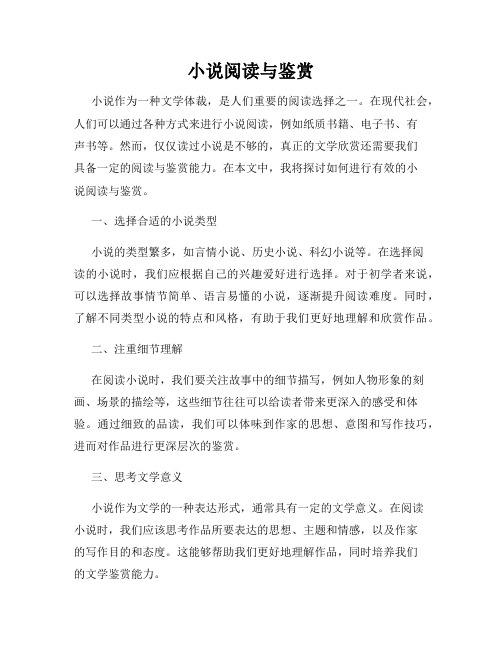
小说阅读与鉴赏小说作为一种文学体裁,是人们重要的阅读选择之一。
在现代社会,人们可以通过各种方式来进行小说阅读,例如纸质书籍、电子书、有声书等。
然而,仅仅读过小说是不够的,真正的文学欣赏还需要我们具备一定的阅读与鉴赏能力。
在本文中,我将探讨如何进行有效的小说阅读与鉴赏。
一、选择合适的小说类型小说的类型繁多,如言情小说、历史小说、科幻小说等。
在选择阅读的小说时,我们应根据自己的兴趣爱好进行选择。
对于初学者来说,可以选择故事情节简单、语言易懂的小说,逐渐提升阅读难度。
同时,了解不同类型小说的特点和风格,有助于我们更好地理解和欣赏作品。
二、注重细节理解在阅读小说时,我们要关注故事中的细节描写,例如人物形象的刻画、场景的描绘等,这些细节往往可以给读者带来更深入的感受和体验。
通过细致的品读,我们可以体味到作家的思想、意图和写作技巧,进而对作品进行更深层次的鉴赏。
三、思考文学意义小说作为文学的一种表达形式,通常具有一定的文学意义。
在阅读小说时,我们应该思考作品所要表达的思想、主题和情感,以及作家的写作目的和态度。
这能够帮助我们更好地理解作品,同时培养我们的文学鉴赏能力。
四、与其他读者交流与其他读者交流是提高小说阅读与鉴赏能力的重要途径。
通过分享自己的阅读体验和理解,我们可以与他人互相启发,获得新的领悟和观点。
此外,也可以参加相关的读书俱乐部或文学讲座,与更多的读者交流与互动,拓宽自己的视野和思考方式。
五、多样化的阅读体验除了传统的纸质书籍,我们还可以尝试其他形式的小说阅读。
如今,电子书和有声书的兴起,为我们提供了更多的选择。
通过电子书,我们可以随时随地进行阅读,而有声书可以带来更加生动的阅读体验。
多样化的阅读体验可以帮助我们更全面地理解和欣赏小说。
通过以上几种方式,我们可以提升自己的小说阅读与鉴赏能力。
阅读小说不仅仅是消遣娱乐,更是一种对文学艺术的欣赏和理解。
通过深入阅读和思考,我们可以感受到小说给予我们的思想冲击和感情共鸣,丰富自己的内心世界。
小说欣赏与分析
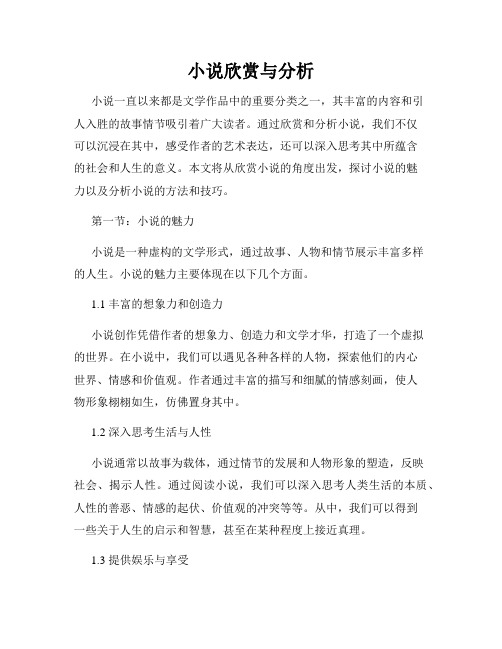
小说欣赏与分析小说一直以来都是文学作品中的重要分类之一,其丰富的内容和引人入胜的故事情节吸引着广大读者。
通过欣赏和分析小说,我们不仅可以沉浸在其中,感受作者的艺术表达,还可以深入思考其中所蕴含的社会和人生的意义。
本文将从欣赏小说的角度出发,探讨小说的魅力以及分析小说的方法和技巧。
第一节:小说的魅力小说是一种虚构的文学形式,通过故事、人物和情节展示丰富多样的人生。
小说的魅力主要体现在以下几个方面。
1.1 丰富的想象力和创造力小说创作凭借作者的想象力、创造力和文学才华,打造了一个虚拟的世界。
在小说中,我们可以遇见各种各样的人物,探索他们的内心世界、情感和价值观。
作者通过丰富的描写和细腻的情感刻画,使人物形象栩栩如生,仿佛置身其中。
1.2 深入思考生活与人性小说通常以故事为载体,通过情节的发展和人物形象的塑造,反映社会、揭示人性。
通过阅读小说,我们可以深入思考人类生活的本质、人性的善恶、情感的起伏、价值观的冲突等等。
从中,我们可以得到一些关于人生的启示和智慧,甚至在某种程度上接近真理。
1.3 提供娱乐与享受小说作为一种文学艺术形式,也是一种娱乐和享受的方式。
通过阅读小说,我们可以暂时摆脱现实的束缚,投入到一个完全不同的世界中,体验各种各样的情节和人物的命运。
有时候,读小说就像是观看一部好电影或剧集,给予我们情绪上的满足和愉悦。
第二节:分析小说的方法和技巧欣赏一本小说并不仅仅是简单地阅读故事,还需要通过分析和思考来深入理解其中的内涵和意义。
以下是一些分析小说的方法和技巧,供读者参考。
2.1 结构与章回小说的结构和章回对于整个故事的发展和信息的传递至关重要。
分析小说时,可以通过探究小说的结构特点,如时间线索、故事架构、章回的安排等,来理解作者的叙事意图和故事结构的变化。
2.2 人物形象与角色性格人物是小说中最重要的元素之一,他们推动着故事的发展,展现着作者的观点和主题。
分析小说时,可以关注人物形象的塑造方式、角色性格的描绘以及人物关系的变化等方面,来理解作者对人性和社会的思考。
高中生经典英文小说阅读与欣赏系列 Sredni Vashtar

Sredni Vashtarby H.H. Munro (SAKI)Conradin was ten years old, and the doctor had pronounced his professional opinion that the boy would not live another five years. The doctor was silky and effete, and counted for little, but his opinion was endorsed by Mrs. De Ropp, who counted for nearly everything. Mrs. De Ropp was Conradin's cousin and guardian, and in his eyes she represented those three-fifths of the world that are necessary and disagreeable and real; the other two-fifths, in perpetual antagonism to the foregoing, were summed up in himself and his imagination. One of these days Conradin supposed he would succumb to the mastering pressure of wearisome necessary things---such as illnesses and coddling restrictions and drawn-out dullness. Without his imagination, which was rampant under the spur of loneliness, he would have succumbed long ago.Mrs. De Ropp would never, in her honestest moments, have confessed to herself that she disliked Conradin, though she might have been dimly aware that thwarting him "for his good" was a duty which she did not find particularly irksome. Conradin hated her with a desperate sincerity which he was perfectly able to mask. Such few pleasures as he could contrive for himself gained an added relish from the likelihood that they would be displeasing to his guardian, and from the realm of his imagination she was locked out---an unclean thing, which should find no entrance.In the dull, cheerless garden, overlooked by so many windows that were ready to open with a message not to do this or that, or a reminder that medicines were due, he found little attraction. The few fruit-trees that it contained were set jealously apart from his plucking, as though they were rare specimens of their kind blooming in an arid waste; it would probably have been difficult to find a market-gardener who would have offered ten shillings for their entire yearly produce. In a forgotten corner, however, almost hidden behind a dismal shrubbery, was a disused tool-shed of respectable proportions, and within its walls Conradin found a haven, something that took on the varying aspects of a playroom and a cathedral. He had peopled it with a legion of familiar phantoms, evoked partly from fragments of history and partly from his own brain, but it also boasted two inmates of flesh and blood. In one corner lived a ragged-plumaged Houdan hen, on which the boy lavished an affection that had scarcely another outlet. Further back in the gloom stood a large hutch, divided into two compartments, one of which was fronted with close iron bars. This was the abode of a large polecat-ferret, which a friendly butcher-boy had once smuggled, cage and all, into its present quarters, in exchange for along-secreted hoard of small silver. Conradin was dreadfully afraid of the lithe, sharp-fanged beast, but it was his most treasured possession. Its very presence in the tool-shed was a secret and fearful joy, to be kept scrupulously from the knowledge of the Woman, as he privately dubbed his cousin. And one day, out of Heaven knows what material, he spun the beast a wonderful name, and from that moment it grew into a god and a religion. The Woman indulged in religion once a week at a church near by, and took Conradin with her, but to him the church service was an alien rite in the House of Rimmon. Every Thursday, in the dim and musty silence of the tool-shed, he worshipped with mystic and elaborate ceremonial before the wooden hutch where dwelt Sredni Vashtar, the great ferret. Red flowers in their season and scarlet berries in the winter-time were offered at his shrine, for he was a god who laid some special stress on the fierce impatient side of things, as opposed to the Woman's religion, which, as far as Conradin could observe, went to great lengths in the contrary direction. And on great festivals powdered nutmeg was strewn in front of his hutch, an important feature of the offering being that the nutmeg had to be stolen. These festivals were of irregular occurrence, and were chiefly appointed to celebrate some passing event. On one occasion, when Mrs. De Ropp suffered from acute toothache for three days, Conradin kept up the festival during the entire three days, and almost succeeded in persuading himself that Sredni Vashtar was personally responsible for the toothache. If the malady had lasted for another day the supply of nutmeg would have given out.The Houdan hen was never drawn into the cult of Sredni Vashtar. Conradin had long ago settled that she was an Anabaptist. He did not pretend to have the remotest knowledge as to what an Anabaptist was, but he privately hoped that it was dashing and not very respectable. Mrs. De Ropp was the ground plan on which he based and detested all respectability.After a while Conradin's absorption in the tool-shed began to attract the notice of his guardian. "It is not good for him to be pottering down there in all weathers," she promptly decided, and at breakfast one morning she announced that the Houdan hen had been sold and taken away overnight. With her short-sighted eyes she peered at Conradin, waiting for an outbreak of rage and sorrow, which she was ready to rebuke with a flow of excellent precepts and reasoning. But Conradin said nothing: there was nothing to be said. Something perhaps in his white set face gave her a momentary qualm, for at tea that afternoon there was toast on the table, a delicacy which she usually banned on the ground that it was bad for him; also because the making of it "gave trouble," a deadly offence in the middle-class feminine eye."I thought you liked toast," she exclaimed, with an injured air, observing that he did not touch it."Sometimes," said Conradin.In the shed that evening there was an innovation in the worship of the hutch-god. Conradin had been wont to chant his praises, tonight be asked a boon."Do one thing for me, Sredni Vashtar."The thing was not specified. As Sredni Vashtar was a god he must be supposed to know. And choking back a sob as he looked at that other empty comer, Conradin went back to the world he so hated.And every night, in the welcome darkness of his bedroom, and every evening in the dusk of the tool-shed, Conradin's bitter litany went up: "Do one thing for me, Sredni Vashtar."Mrs. De Ropp noticed that the visits to the shed did not cease, and one day she made a further journey of inspection."What are you keeping in that locked hutch?" she asked. "I believe it's guinea-pigs. I'll have them all cleared away."Conradin shut his lips tight, but the Woman ransacked his bedroom till she found the carefully hidden key, and forthwith marched down to the shed to complete her discovery. It was a cold afternoon, and Conradin had been bidden to keep to the house. From the furthest window of the dining-room the door of the shed could just be seen beyond the corner of the shrubbery, and there Conradin stationed himself. He saw the Woman enter, and then be imagined her opening the door of the sacred hutch and peering down with her short-sighted eyes into the thick straw bed where his god lay hidden. Perhaps she would prod at the straw in her clumsy impatience. And Conradin fervently breathed his prayer for the last time. But he knew as he prayed that he did not believe. He knew that the Woman would come out presently with that pursed smile he loathed so well on her face, and that in an hour or two the gardener would carry away his wonderful god, a god no longer, but a simple brown ferret in a hutch. And he knew that the Woman would triumph always as she triumphed now, and that he would grow ever more sickly under her pestering and domineering and superior wisdom, till one day nothing would matter much more with him, and the doctor would be proved right. And in the sting and misery of his defeat, he began to chant loudly and defiantly the hymn of his threatened idol:Sredni Vashtar went forth,His thoughts were red thoughts and his teeth were white.His enemies called for peace, but he brought them death.Sredni Vashtar the Beautiful.And then of a sudden he stopped his chanting and drew closer to the window-pane. The door of the shed still stood ajar as it had been left, and the minutes were slipping by. They were long minutes, but they slipped by nevertheless.He watched the starlings running and flying in little parties across the lawn; he counted them over and over again, with one eye always on that swinging door. A sour-faced maid came in to lay the table for tea, and still Conradin stood and waited and watched. Hope had crept by inches into his heart, and now a look of triumph began to blaze in his eyes that had only known the wistful patience of defeat. Under his breath, with a furtive exultation, he began once again the pan of victory and devastation. And presently his eyes were rewarded: out through that doorway came a long, low, yellow-and-brown beast, with eyes a-blink at the waning daylight, and dark wet stains around the fur of jaws and throat. Conradin dropped on his knees. The great polecat-ferret made its way down to a small brook at the foot of the garden, drank for a moment, then crossed a little plank bridge and was lost to sight in the bushes. Such was the passing of Sredni Vashtar."Tea is ready," said the sour-faced maid; "where is the mistress?" "She went down to the shed some time ago," said Conradin. And while the maid went to summon her mistress to tea, Conradin fished a toasting-fork out of the sideboard drawer and proceeded to toast himself a piece of bread. And during the toasting of it and the buttering of it with much butter and the slow enjoyment of eating it, Conradin listened to the noises and silences which fell in quick spasms beyond the dining-room door. The loud foolish screaming of the maid, the answering chorus of wondering ejaculations from the kitchen region, the scuttering footsteps and hurried embassies for outside help, and then, after a lull, the scared sobbings and the shuffling tread of those who bore a heavy burden into the house."Whoever will break it to the poor child? I couldn't for the life of me!" exclaimed a shrill voice. And while they debated the matter among themselves, Conradin made himself another piece of toast.。
小说阅读赏析主要表现手法及效果

“这很好。”禹说着,向他弯一弯腰。
“不过第一要紧的是赶快派一批大木筏去,把学者们接上高原来。” 第三位大员说,“学者们有一个公呈在这里,他们以为文化是一国的命脉, 学者是文化的灵魂,只要文化存在,华夏也就存在,别的一切,倒还在其 次……”
陆根元形象转变使先生们深 受触动,他们的对话和争论 起到了揭示文本主题,探讨
这真是一件细微的事教育情的,针但对感性动问题了的田效先果生。。晚上他和几个 同事在运动场中乘凉,忽然拍着葵扇说道:“我们不如那个铜 匠,不如那个铜匠!”他又说道:“陆根元这孩子,我们用尽 了方法,总不能凿开他的浑沌的窍。谁知他学铜匠倒有点儿近 情!”
他见了学校里的诸位先 生,都叫一声,不等先生们答 应,便走了过去。
他工作了两三点钟工夫 ,应行修理的门窗都弄好了。 他用脏黑的手拭了脸上的汗, 带着工具自去。
19. 请分析文中画线部分 的表现手法和表达效果。 (4分)
答:肖像(细节)描写,表 现陆根元自然随意的性 格和艰苦辛劳的职业特 征。(4分。每点2分)
篇目
设问方式
参考答案
《歌手》
15. 请分析第⑤段中, 作者是如何描写雅什 卡的歌声的。(4分)
正面描写唱歌的过程,多用比喻,使 得歌声形象可感;侧面通过“我”和 其他听众的反应,衬托歌声的美妙而 令人震撼的特点。(每点2分)
《小铜 匠》
19. 请分析文中画线部 分的表现手法和表达 效果。(4分)
肖像(细节)描写,表现陆根元自然随意 的性格和艰苦辛劳的职业特征。(4分。 每点2分)
“他们以为华夏的人口太多了,”第一位大员道,“减少一些倒也是 致太平之道。况且那些不过是愚民,那喜怒哀乐,也决没有智者所推想的 那么精微的。……”
小小说名作、佳作阅读与欣赏(5)
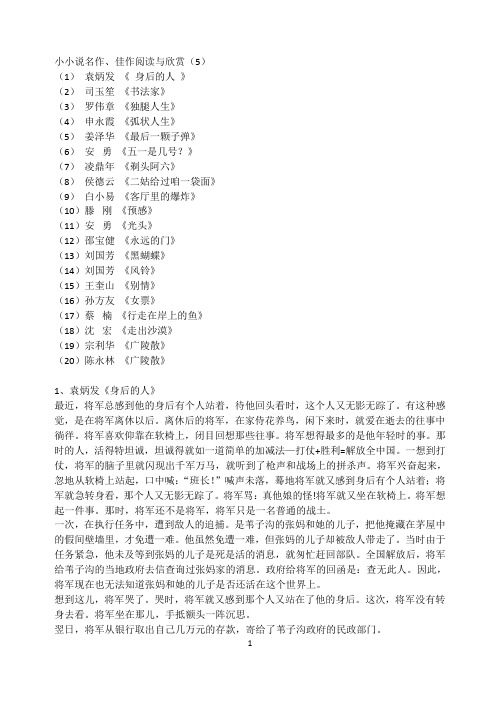
小小说名作、佳作阅读与欣赏(5)(1)袁炳发《身后的人》(2)司玉笙《书法家》(3)罗伟章《独腿人生》(4)申永霞《弧状人生》(5)姜泽华《最后一颗子弹》(6)安勇《五一是几号?》(7)凌鼎年《剃头阿六》(8)侯德云《二姑给过咱一袋面》(9)白小易《客厅里的爆炸》(10)滕刚《预感》(11)安勇《光头》(12)邵宝健《永远的门》(13)刘国芳《黑蝴蝶》(14)刘国芳《风铃》(15)王奎山《别情》(16)孙方友《女票》(17)蔡楠《行走在岸上的鱼》(18)沈宏《走出沙漠》(19)宗利华《广陵散》(20)陈永林《广陵散》1、袁炳发《身后的人》最近,将军总感到他的身后有个人站着,待他回头看时,这个人又无影无踪了。
有这种感觉,是在将军离休以后。
离休后的将军,在家侍花养鸟,闲下来时,就爱在逝去的往事中徜徉。
将军喜欢仰靠在软椅上,闭目回想那些往事。
将军想得最多的是他年轻时的事。
那时的人,活得特坦诚,坦诚得就如一道简单的加减法—打仗+胜利=解放全中国。
一想到打仗,将军的脑子里就闪现出千军万马,就听到了枪声和战场上的拼杀声。
将军兴奋起来,忽地从软椅上站起,口中喊:“班长!”喊声未落,蓦地将军就又感到身后有个人站着;将军就急转身看,那个人又无影无踪了。
将军骂:真他娘的怪!将军就又坐在软椅上。
将军想起一件事。
那时,将军还不是将军,将军只是一名普通的战土。
一次,在执行任务中,遭到敌人的追捕。
是苇子沟的张妈和她的儿子,把他掩藏在茅屋中的假间壁墙里,才免遭一难。
他虽然免遭一难,但张妈的儿子却被敌人带走了。
当时由于任务紧急,他未及等到张妈的儿子是死是活的消息,就匆忙赶回部队。
全国解放后,将军给苇子沟的当地政府去信查询过张妈家的消息。
政府给将军的回函是:查无此人。
因此,将军现在也无法知道张妈和她的儿子是否还活在这个世界上。
想到这儿,将军哭了。
哭时,将军就又感到那个人又站在了他的身后。
这次,将军没有转身去看。
将军坐在那儿,手抵额头一阵沉思。
小说创作范文欣赏与评析
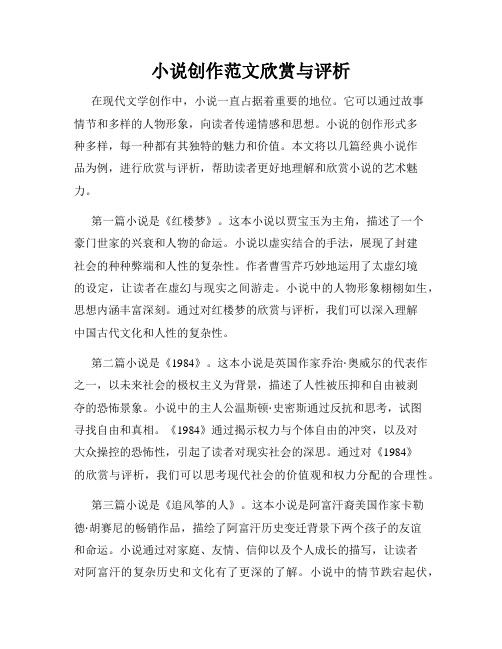
小说创作范文欣赏与评析在现代文学创作中,小说一直占据着重要的地位。
它可以通过故事情节和多样的人物形象,向读者传递情感和思想。
小说的创作形式多种多样,每一种都有其独特的魅力和价值。
本文将以几篇经典小说作品为例,进行欣赏与评析,帮助读者更好地理解和欣赏小说的艺术魅力。
第一篇小说是《红楼梦》。
这本小说以贾宝玉为主角,描述了一个豪门世家的兴衰和人物的命运。
小说以虚实结合的手法,展现了封建社会的种种弊端和人性的复杂性。
作者曹雪芹巧妙地运用了太虚幻境的设定,让读者在虚幻与现实之间游走。
小说中的人物形象栩栩如生,思想内涵丰富深刻。
通过对红楼梦的欣赏与评析,我们可以深入理解中国古代文化和人性的复杂性。
第二篇小说是《1984》。
这本小说是英国作家乔治·奥威尔的代表作之一,以未来社会的极权主义为背景,描述了人性被压抑和自由被剥夺的恐怖景象。
小说中的主人公温斯顿·史密斯通过反抗和思考,试图寻找自由和真相。
《1984》通过揭示权力与个体自由的冲突,以及对大众操控的恐怖性,引起了读者对现实社会的深思。
通过对《1984》的欣赏与评析,我们可以思考现代社会的价值观和权力分配的合理性。
第三篇小说是《追风筝的人》。
这本小说是阿富汗裔美国作家卡勒德·胡赛尼的畅销作品,描绘了阿富汗历史变迁背景下两个孩子的友谊和命运。
小说通过对家庭、友情、信仰以及个人成长的描写,让读者对阿富汗的复杂历史和文化有了更深的了解。
小说中的情节跌宕起伏,人物形象鲜明,情感真实。
通过对《追风筝的人》的欣赏与评析,我们可以体味到人性的善与恶、友情的可贵以及家庭的重要性。
第四篇小说是《活着》。
这本小说是中国作家余华的代表作之一,以中国历史背景下的农村生活为题材,描述了一个普通农民的命运。
小说通过对人物家庭的变故和社会的变迁的描写,呈现了人类的生存状态和人性的抉择。
小说中的故事深深触动了读者的内心,引发人们对生命意义和尊严的思考。
通过对《活着》的欣赏与评析,我们可以更加关注社会底层人民的苦难和生存困境。
小小说名作、佳作阅读与欣赏(7)
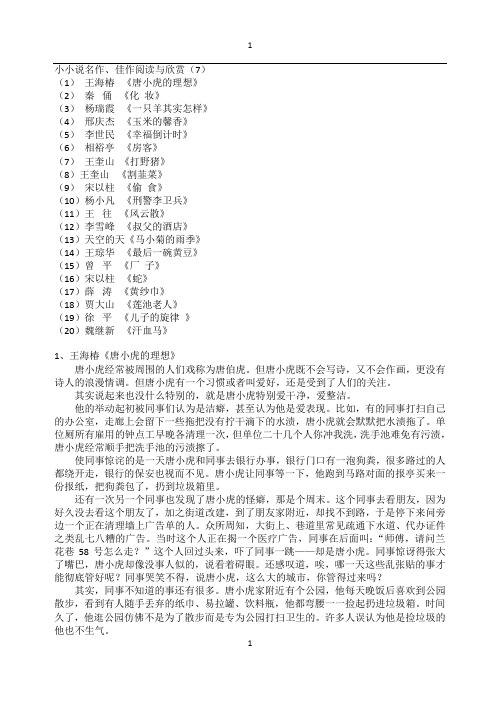
小小说名作、佳作阅读与欣赏(7)(1)王海椿《唐小虎的理想》(2)秦俑《化妆》(3)杨瑞霞《一只羊其实怎样》(4)邢庆杰《玉米的馨香》(5)李世民《幸福倒计时》(6)相裕亭《房客》(7)王奎山《打野猪》(8)王奎山《割韮菜》(9)宋以柱《偷食》(10)杨小凡《刑警李卫兵》(11)王往《风云散》(12)李雪峰《叔父的酒店》(13)天空的天《马小菊的雨季》(14)王琼华《最后一碗黄豆》(15)曾平《厂子》(16)宋以柱《蛇》(17)薛涛《黄纱巾》(18)贾大山《莲池老人》(19)徐平《儿子的旋律》(20)魏继新《汗血马》1、王海椿《唐小虎的理想》唐小虎经常被周围的人们戏称为唐伯虎。
但唐小虎既不会写诗,又不会作画,更没有诗人的浪漫情调。
但唐小虎有一个习惯或者叫爱好,还是受到了人们的关注。
其实说起来也没什么特别的,就是唐小虎特别爱干净,爱整洁。
他的举动起初被同事们认为是洁癖,甚至认为他是爱表现。
比如,有的同事打扫自己的办公室,走廊上会留下一些拖把没有拧干滴下的水渍,唐小虎就会默默把水渍拖了。
单位厕所有雇用的钟点工早晚各清理一次,但单位二十几个人你冲我洗,洗手池难免有污渍,唐小虎经常顺手把洗手池的污渍擦了。
使同事惊诧的是一天唐小虎和同事去银行办事,银行门口有一泡狗粪,很多路过的人都绕开走,银行的保安也视而不见。
唐小虎让同事等一下,他跑到马路对面的报亭买来一份报纸,把狗粪包了,扔到垃圾箱里。
还有一次另一个同事也发现了唐小虎的怪癖,那是个周末。
这个同事去看朋友,因为好久没去看这个朋友了,加之街道改建,到了朋友家附近,却找不到路,于是停下来问旁边一个正在清理墙上广告单的人。
众所周知,大街上、巷道里常见疏通下水道、代办证件之类乱七八糟的广告。
当时这个人正在揭一个医疗广告,同事在后面叫:“师傅,请问兰花巷58号怎么走?”这个人回过头来,吓了同事一跳——却是唐小虎。
同事惊讶得张大了嘴巴,唐小虎却像没事人似的,说看着碍眼。
职高语文教案

职高语文教案题目:小说阅读与欣赏一、教学目标1.知识与技能:①理解并掌握小说的基本特征和分类。
②掌握小说的阅读技巧,提高阅读理解的能力。
③通过对经典小说的欣赏,提高学生的审美情趣。
2.过程与方法:①讲授和引导相结合,灵活运用讲解、示范、引导等方法。
②合作学习与个性发展相结合。
3.情感态度价值观:通过小说的阅读与欣赏,培养学生对优秀文学作品的理解与欣赏能力,提高学生的文学素养。
二、教学重点与难点1.教学重点①了解小说的基本特征和分类。
②掌握小说的阅读技巧,提高阅读理解能力。
2.教学难点小说阅读与欣赏的技巧和方法。
三、教学过程1.导入新课通过对学生最喜欢的小说的介绍和朗读,引发学生对小说的兴趣,激发学习的积极性。
2.讲解小说的基本特征和分类通过讲解小说的基本特征和分类,让学生了解小说与其他文学体裁的区别。
3.学习小说的阅读技巧①了解小说的情节结构,包括起承转合等。
②学习识别小说的人物形象,包括主角、配角、形象刻画等。
③掌握阅读小说的方法,包括分析描写、寻找线索等。
④培养学生的阅读策略,包括预测、推理、总结等。
4.小组合作阅读与讨论将学生分成小组,每组阅读一篇经典小说的章节,并讨论其中的人物形象、情节发展等内容。
通过小组合作,培养学生的合作与沟通能力。
5.小说欣赏与评价选取一部经典小说或文学作品的片段进行欣赏,并让学生发表自己的评价和感受。
通过欣赏与评价,培养学生的审美情趣和独立思考能力。
四、教学反思通过本节课的教学,学生对小说的基本特征和分类有了更深入的理解,掌握了小说的阅读技巧,提高了阅读理解的能力。
通过小组合作和小说欣赏,培养了学生的合作与沟通能力,提高了学生的审美情趣和独立思考能力。
但是,教学过程中还可以更加注重培养学生的阅读兴趣,激发学生对阅读的热爱。
同时,教师在评价学生的作品时应充分尊重学生的个性与创造力,给予肯定与鼓励。
阅读推荐:经典文学作品欣赏与解析
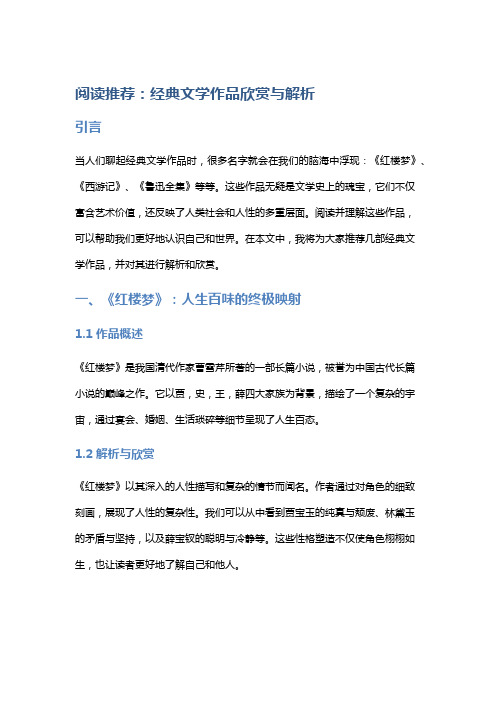
阅读推荐:经典文学作品欣赏与解析引言当人们聊起经典文学作品时,很多名字就会在我们的脑海中浮现:《红楼梦》、《西游记》、《鲁迅全集》等等。
这些作品无疑是文学史上的瑰宝,它们不仅富含艺术价值,还反映了人类社会和人性的多重层面。
阅读并理解这些作品,可以帮助我们更好地认识自己和世界。
在本文中,我将为大家推荐几部经典文学作品,并对其进行解析和欣赏。
一、《红楼梦》:人生百味的终极映射1.1 作品概述《红楼梦》是我国清代作家曹雪芹所著的一部长篇小说,被誉为中国古代长篇小说的巅峰之作。
它以贾,史,王,薛四大家族为背景,描绘了一个复杂的宇宙,通过宴会、婚姻、生活琐碎等细节呈现了人生百态。
1.2 解析与欣赏《红楼梦》以其深入的人性描写和复杂的情节而闻名。
作者通过对角色的细致刻画,展现了人性的复杂性。
我们可以从中看到贾宝玉的纯真与颓废、林黛玉的矛盾与坚持,以及薛宝钗的聪明与冷静等。
这些性格塑造不仅使角色栩栩如生,也让读者更好地了解自己和他人。
此外,小说中的情节扣人心弦。
从贾宝玉早年的离家困窘,到后来的宴会、婚姻纷争,故事情节层层推进,引人入胜。
《红楼梦》的情节设计紧密,既展现了宫廷生活的细节,又透露出许多意味深长的信息,让人回味无穷。
二、《西游记》:瑰丽的幻想世界2.1 作品概述《西游记》是明代作家吴承恩创作的一部长篇小说,被视为中国古代长篇小说中的四大名著之一。
它讲述了僧人玄奘师徒四人历经千辛万苦,取经天竺的故事。
2.2 解析与欣赏《西游记》将佛教、道教、儒家等思想和神话故事巧妙融合,创造了一个瑰丽的幻想世界。
作品中的角色形象个性鲜明,各具特色。
孙悟空机智聪明,悟性极高;猪八戒呆萌可爱,却极为贪吃;沙僧沉默寡言,但忠诚可靠。
他们的形象不仅展现了作者的艺术才华,也给读者留下了深刻的印象。
此外,小说中蕴含了丰富的哲理和人生道理。
作者在讲述师徒取经的故事同时,也在探讨人性的善恶、修行的道理等。
例如,师徒四人在面对艰难困苦时,始终保持着善良和正直,教导了读者应如何面对挑战和困境。
高中生经典英文小说阅读与欣赏系列 A resumed identity

A RESUMED IDENTITYby Ambrose Bierce1: The Review as a Form of WelcomeONE summer night a man stood on a low hill overlooking a wide expanse of forest and field. By the full moon hanging low in the west he knew what he might not have known otherwise: that it was near the hour of dawn. A light mist lay along the earth, partly veiling the lower features of the landscape, but above it the taller trees showed in well- defined masses against a clear sky. Two or three farmhouses were visible through the haze, but in none of them, naturally, was a light.Nowhere, in- deed, was any sign or suggestion of life except the barkingof a distant dog, which, repeated with mechanical iteration, servedrather to accentuate than dispel the loneliness of the scene.The man looked curiously about him on all sides, as one who amongfamiliar surroundings is unable to determine his exact place and part inthe scheme of things. It is so, perhaps, that we shall act when, risenfrom the dead, we await the call to judgment.A hundred yards away was a straight road, show- ing white in the moonlight. Endeavouring to orient himself, as a surveyor or navigatormight say, the man moved his eyes slowly along its visible length and ata distance of a quarter-mile to the south of his station saw, dim andgrey in the haze, a group of horsemen riding to the north. Behind themwere men afoot, marching in column, with dimly gleaming rifles aslantabove their shoulders. They moved slowly and in silence. Another groupof horsemen, another regiment of infantry, another and another --all in unceasing motion toward the man's point of view, past it, and beyond. Abattery of artillery followed, the cannoneers riding with folded arms onlimber and caisson. And still the interminable procession came out ofthe obscurity to south and passed into the obscurity to north, withnever a sound of voice, nor hoof, nor wheel.The man could not rightly understand: he thought himself deaf; saidso, and heard his own voice, al- though it had an unfamiliar qualitythat almost alarmed him; it disappointed his ear's expectancy in thematter of timbre and resonance. But he was not deaf, and that for themoment sufficed.Then he remembered that there are natural phe- nomena to which someone has given the name 'acoustic shadows.' If you stand in an acousticshadow there is one direction from which you will hear nothing. At the battle of Gaines's Mill, one of the fiercest conflicts of the Civil War,with a hundred guns in play, spectators a mile and a half away on the opposite side of the Chickahominy Valley heard nothing of what they clearly saw. The bombardment of Port Royal, heard and felt at St. Augustine, a hundred and fifty miles to the south, was inaudible twomiles to the north in a still atmosphere. A few days before thesurrender at Ap- pomattox a thunderous engagement between the commands of Sheridan and Pickett was unknown to the latter commander, a mile in the rear of his own line.These instances were not known to the man of whom we write, but less striking ones of the same character had not escaped his observation. He was profoundly disquieted, but for another reason than the uncanny silence of that moonlight march.'Good Lord! ' he said to himself--and again it was as if another had spoken his thought--'if those people are what I take them to be we havelost the battle and they are moving on Nashville!'Then came a thought of self--an apprehension --a strong sense of personal peril, such as in an- other we call fear. He stepped quicklyinto the shadow of a tree. And still the silent battalions moved slowly forward in the haze.The chill of a sudden breeze upon the back of his neck drew his attention to the quarter whence it came, and turning to the east he sawa faint grey light along the horizon--the first sign of return- ing day.This increased his apprehension.'I must get away from here,' he thought, 'or I shall be discoveredand taken.'He moved out of the shadow, walking rapidly toward the greying east. From the safer seclusion of a clump of cedars he looked back. The entire column had passed out of sight: the straight white road lay bare and desolate in the moonlight!Puzzled before, he was now inexpressibly astonished. So swift a passing of so slow an army!--he could not comprehend it. Minute after minute passed unnoted; he had lost his sense of time. He sought with a terrible earnestness a solution of the mystery, but sought in vain. Whenat last he roused himself from his abstraction the sun's rim was visi-ble above the hills, but in the new conditions he found no other lightthan that of day; his understanding was involved as darkly in doubt as before.On every side lay cultivated fields showing no sign of war and war's ravages. From the chimneys of the farmhouses thin ascensions of blue smoke signalled preparations for a day's peaceful toil. Having stilledits immemorial allocution to the moon, the watch-dog was assisting anegro who, prefixing a team of mules to the plough, was flatting and sharping contentedly at his task. The hero of this tale staredstupidly at the pastoral picture as if he had never seen such a thing inall his life; then he put his hand to his head, passed it through hishair and, withdrawing it, attentively considered the palm--a singularthing to do. Apparently reassured by the act, he walked confidentlytoward the road.2: When You have Lost Your Life Consult a PhysicianDr. Stilling Malson, of Murfreesboro, having visited a patient sixor seven miles away, on the Nash- ville road, had remained with him all night. At daybreak he set out for home on horseback, as was the customof doctors of the time and region. He had passed into the neighbourhoodof Stone's River battlefield when a man approached him from the road-side and saluted in the military fashion, with a movement of the righthand to the hat-brim. But the hat was not a military hat, the man wasnot in uniform and had not a martial bearing. The doctor noddedcivilly, half thinking that the stranger's uncommon greeting wasperhaps in deference to the historic surroundings. As the strangerevidently desired speech with him he courteously reined in his horseand waited.'Sir,' said the stranger, 'although a civilian, you are perhaps an enemy.''I am a physician,' was the non-committal reply.'Thank you,' said the other. 'I am a lieutenant, of the staff ofGeneral Hazen.' He paused a moment and looked sharply at the person whom he was addressing, then added, 'Of the Federal army.' The physicianmerely nodded.'Kindly tell me,' continued the other, 'what has happened here.Where are the armies? Which has won the battle?'The physician regarded his questioner curiously with half-shut eyes. After a professional scrutiny, prolonged to the limit of politeness,'Pardon me,' he said; 'one asking information should be willing toimpart it. Are you wounded?' he added, smiling.'Not seriously--it seems.'The man removed the unmilitary hat, put his hand to his head, passed it through his hair and, withdrawing it, attentively considered the palm.'I was struck by a bullet and have been unconscious. It must have been a light, glancing blow: I find no blood and feel no pain. I willnot trouble you for treatment, but will you kindly direct me to my command--to any part of the Federal army--if you know?'Again the doctor did not immediately reply: he was recalling much that is recorded in the books of his profession--something about lost identity and the effect of familiar scenes in restoring it. At length he looked the man in the face, smiled, and said:'Lieutenant, you are not wearing the uniform of your rank and service.'At this the man glanced down at his civilian attire, lifted hiseyes, and said with hesitation:'That is true. I--I don't quite understand.'Still regarding him sharply but not unsympathetically, the man of science bluntly inquired:'How old are you?''Twenty-three--if that has anything to do with it.''You don't look it; I should hardly have guessed you to be just that.'The man was growing impatient. 'We need not discuss that,' he said: 'I want to know about the army. Not two hours ago I saw a column of troops moving northward on this road. You must have met them. Be good enough to tell me the colour of their clothing, which I was unable to make out, and I'll trouble you no more.''You are quite sure that you saw them?''Sure? My God, sir, I could have counted them!''Why, really,' said the physician, with an amusing consciousness of his own resemblance to the loquacious barber of the Arabian Nights,'this is very in- teresting. I met no troops.'The man looked at him coldly, as if he had himself observed the likeness to the barber. 'It is plain,' he said, 'that you do not care toassist me. Sir, you may go to the devil!'He turned and strode away, very much at random, across the dewy fields, his half-penitent tormentor quietly watching him from hispoint of vantage in the saddle till he disappeared beyond an array of trees.3: The Danger of Looking into a Pool of WaterAfter leaving the road the man slackened his pace, and now went forward, rather deviously, with a distinct feeling of fatigue. Hecould not account for this, though truly the interminable loquacity of that country doctor offered itself in explanation. Seating himself upona rock, he laid one hand upon his knee, back upward, and casually looked at it. It was lean and withered. He lifted both hands to his face. Itwas seamed and furrowed; he could trace the lines with the tips of his fingers. How strange!--a mere bullet-stroke and a brief unconsciousness should not make one a physical wreck.'I must have been a long time in hospital,' he said aloud. 'Why,what a fool I am! The battle was in December, and it is now summer!' He laughed. 'No wonder that fellow thought me an escaped luna- tic. He was wrong: I am only an escaped patient.'At a little distance a small plot of ground enclosed by a stone wall caught his attention. With no very definite intent he rose and went toit. In the centre was a square, solid monument of hewn stone. It was brown with age, weather-worn at the angles, spotted with moss and lichen. Between the massive blocks were strips of grass the leverage of whose roots had pushed them apart. In answer to the challenge of this ambitious structure Time had laid his destroying hand upon it, and it would soon be 'one with Nineveh and Tyre.' In an inscription on one side his eye caught a familiar name. Shaking with excitement, he craned his body across the wall and read:HAZEN'S BRIGADEtoThe Memory of Its Soldierswho fell at Stone River, Dec. 31, 1862.The man fell back from the wall, faint and sick. Almost within an arm's length was a little depression in the earth; it had been filled bya recent rain--a pool of clear water. He crept to it to revive himself,lifted the upper part of his body on his trembling arms, thrust forward his head and saw the reflection of his face, as in a mirror. He uttereda terrible cry. His arms gave way; he fell, face downward, into the pool and yielded up the life that had spanned another life.。
外国小说赏析概念及方法

典型题型
• ①找出体现小说主题的句子(或用自 己的话概括作品的主题); • ②读了全文后,文章让你明白了什 么道理(本文对你有何启迪?谈谈你 的一点体会); • ③结合全文主题,谈谈你对某一句 话的理解和看法。
(四)如何分析小说中的人物形象
人物描写
人物性格
文章的思想内容
1.从分析人物的直接描写入手。
体味多样的人生
——浅谈小说阅读的方法和技巧
( 一 ) 小 说 概 念 及 要 素
概念:小说是以塑造人物形象
为中心,通过故事情节的叙述和环 境的描写反映社会生活的一种叙事 性的文学体裁。
.
要素:生动的人物形象、完整
的故事情节和人物活动的典型环境 是小说必须具备的三要素。其中, 人物形象又是主要要素。
细节描写在文章描写中的地位看似闲笔或赘笔,信手拈来, 无关紧要,可有可无;但都是作者精心的设置和安排,不能 随意取代。
高中语文阅读经典文学赏析之短篇小说初探

高中语文阅读经典文学赏析之短篇小说初探短篇小说是文学中的一种重要文体,它通常以一个完整的故事情节来呈现作者的思想、感情和审美追求。
高中语文教学中,短篇小说是必修的阅读内容,通过学习和阅读短篇小说,不仅可以提高语言表达能力和阅读理解能力,还能够拓展文化视野,提高对人生观、价值观的理解。
以下将对短篇小说的特点、阅读方法和常见的经典作品进行初步探讨。
短篇小说的特点短篇小说和传统小说有着很大的不同,主要表现在以下几个方面:一、篇幅较短:短篇小说通常只有几千字,很少超过万字,因此要在极短的空间内完成故事的构建和情感的表达。
二、故事紧凑:短篇小说最大的特点是情节跌宕起伏,紧凑有力。
故事情节通常较简洁,表现手法简洁明了,直接表达作者的中心思想。
三、文风独特:短篇小说经常用到语言的修辞手法,如比喻、象征、暗示等,使作品更加生动、形象。
四、察言观色:在短篇小说中,人物的行动、心理、语言等都是紧密联系的。
作者通过对行为、语言、心理的描写,表现人物的性格特征和内心世界。
如何阅读短篇小说短篇小说的阅读主要分为四个方面。
一、作者的生平:了解作者的经历、文化背景和人生经历,可以更好地理解和欣赏其作品。
二、标题和开篇:标题和开篇是短篇小说中最重要的两个部分。
通过标题和开篇,可以了解作品的主旨和主题,启发自己的思考,帮助自己更好地理解作品。
三、故事情节:故事情节是短篇小说最重要的部分,阅读短篇小说要理解情节发展、人物之间的关系,揭示故事中所蕴含的主题和思想。
四、文学技法:短篇小说中运用了很多的文学技法,比如象征、暗示、对比等,对文学技法的认识有助于更深入地理解作品,发现作者的写作技巧。
短篇小说涉及的题材和风格非常多样化,以下列出一些高中语文常见的经典短篇小说:一、鲁迅《朝花夕拾》这是鲁迅的一部散文集,全书以都市记忆为线索,按时间先后分为十篇,通过这些往事,回忆了作者在青年时代的人际关系、学习经历、宗教信仰和爱情观等方面的成长历程。
- 1、下载文档前请自行甄别文档内容的完整性,平台不提供额外的编辑、内容补充、找答案等附加服务。
- 2、"仅部分预览"的文档,不可在线预览部分如存在完整性等问题,可反馈申请退款(可完整预览的文档不适用该条件!)。
- 3、如文档侵犯您的权益,请联系客服反馈,我们会尽快为您处理(人工客服工作时间:9:00-18:30)。
《保护人》
《面包》 《骆驼祥子》 《洗澡》 《碑》 《溜索》
新课标全国卷
广东卷 山东卷 辽宁卷 安徽卷 江苏卷
2010年
2010年 2010年 2010年 2010年 2010年
题型示例
• 1 、小说中的某人具有哪些性 格特点?请简要分析概括。 • 2、概括小说中某人物形象。 • 3、赏析文中某某的形象。 • 4、小说中的某人是一个什么样 的人?在刻画这一形象时,主要采 用了哪些手法?试简要说明
《父爱无价》 《林冲见差拨》 《日月行色》 《候银匠》 《二十年以后》 《乌米》 《河的第三条岸》 《蕫师傅游湖》 《遗璞》 《孕妇和牛》 《想像》 《魔盒》
上海春季 海南、宁夏 湖北 江苏 海南、宁夏 浙江 广东 安徽 辽宁 海南、宁夏 四川 浙江
2007年 2007年 2007年 2008年 2008年 2008年 2008年 2009年 2009年 2009年 2009年 2009年
小说阅读 ——分析人物形象
•学习目标: • 1、分析小说人物形象,概括 形象特征,明确形象意义。 • 2、掌握形象分析的方法,明 晰“形象类”题目的解题思路。
ቤተ መጻሕፍቲ ባይዱ
考纲解读
(一)2010年江苏语文高考考试说明: • 1、注意小说中人物、情节、环境构 成的形象世界。(分析综合 C) • 2、欣赏作品中塑造的人物形象。 (鉴赏评价 D)
问题2参考:贝格斯太 太是一位淳朴善良,热情 爽直;观察敏锐,善解人 意;热爱故土,珍视亲情 的旅馆女房东形象(房东 老太太形象)。
即:人物性格+身份+简析
• 2、赏析形象类 • (1)、找准使用的描写手法 • (2)、简要分析内容 • (3)、表现的人物性格
即:手法+内容分析+效果
能力提升
《谁能让我忘记 》 侯德云 • 参考答案: 1、质朴直爽、有责任感、疼爱孩子、勤俭 节约。 2、“爹”是 一位质朴直爽、有责任感、疼 爱孩子、勤俭节约的农民父亲形象。分析略 3、运用细节描写。“扎”写出了“爹”对 我的“浪费行为”的不满和责怪,“压”“刨” 形象地写了“爹”吃西瓜时唯恐浪费而尽力啃干 净的情形。(2分)表现了“爹”的勤俭节约。
• 分析鉴赏人物形象的角度 • 从分析人物描写的方法及作用入手,赏 析人物形象 • 从分析人物活动的环境入手,探究人物 命运与思想性格形成的原因 • 从分析情节入手,把握人物的性格特征 • 从人物间的关系入手,分析人物性格 • 从分析小说的主题入手,揣摩作者的评 价
问题3参考 (1)运用了神态、语言、动作、细 节等描写手法。(2)如“她带着 母亲般的慈爱拉了拉我的衣袖”, 请“我”喝茶;她通过我手提箱上 的标签及我的举动就看出我心情不 佳;对魔盒的珍惜等情节。(3) 体现贝格斯太太是一位淳朴善良, 热情爽直;观察敏锐,善解人意; 热爱故土,珍视亲情的旅馆女房东 形象(房东老太太形象) 。
问题变体
•
4、赏析 “贝格斯太太现在不再 盯着我了,她注视着这陈旧的纸盒, 指头轻抚盒盖,陷入沉思之中。” 这句话表现了贝格斯太太怎样的性格? • 参考答案:运用细节描写。“注 视”、“轻抚”等词表现她对盒子的 珍视,体现她热爱故乡、珍视亲情的 性格。
规律总结
•(一)、解题思路 • 1、 紧扣小说具体情节分析 • 2、 结合对人物的具体描写 及刻画人物的手法分析。
• 真题体验
《魔盒》 (2009年浙江卷) 1、概括小说中贝格斯太太的性格。请简要分析。 参考答案:贝格斯太太淳朴善良,热情爽直;观察 敏锐,善解人意;热爱故土,珍视亲情。 如“她带着母亲般的慈爱拉了拉我的衣袖”,请 “我”喝茶体现她善良,热情爽直;她通过我手提箱上 的标签及我的举动就看出我心情不佳体现观察敏锐,善 解人意;对魔盒的珍惜体现热爱故土,珍视亲情。 提问变体示例: 2、概括小说中贝格斯太太的形象。 3、赏析文中贝格斯太太的形象。(不超过100字) (5分)
(二)答题模式
1、概括形象类 (1)、归纳人物的类型 (身份) 如:知识青年、英雄形象、妇女形象、小市民、官 员形象、工人形象…… (2)、分析人物性格的特点 注意:一般使用形容词 如:温柔、善良、稳重、纯朴、豪爽、乐观开朗、 敏感、旷达、懦弱、坚强、吝啬、委曲求全、逆来顺 受、勇于抗争…… (3)、结合文本简要分析
